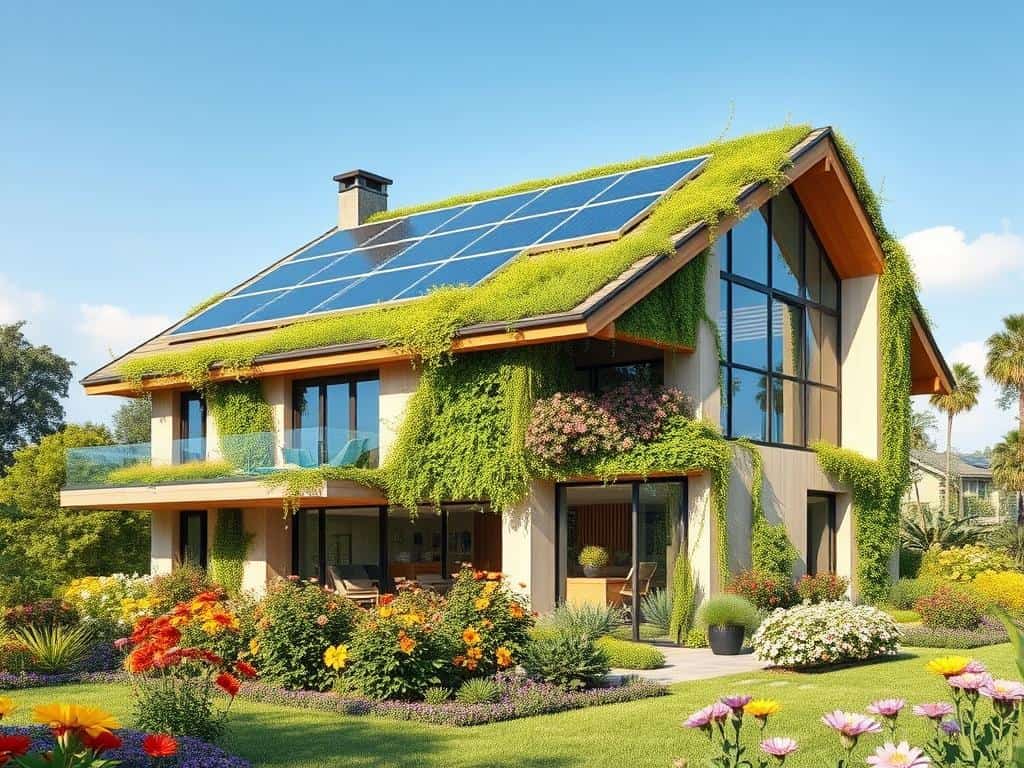Did you know the global market for smart home devices grew by 33% from 2019 to 2020? This huge increase shows a big move towards a greener lifestyle. Smart technology is more than just making life easier; it’s key to living sustainably. Smart homes use the Internet of Things (IoT) to use resources better, making our daily lives greener.
Energy-saving appliances can cut down electricity use by 20% compared to old homes. Smart thermostats also save money, lowering heating costs by 10-12% and cooling costs by 15%. These examples show how green tech is changing our homes.
Adding smart features like solar panels can cut electricity bills by 50-75%. Water-saving devices can reduce water use by up to 30%. Smart homes are a big step towards using resources wisely and helping our planet.
Key Takeaways
- Smart homes reduce electricity consumption by up to 20% compared to traditional homes.
- Integration of solar panels can lead to a 50-75% reduction in electricity bills.
- Water-saving fixtures enable a decrease in water usage by up to 30%.
- Smart thermostats provide savings of 10-12% for heating and 15% for cooling.
- The rise of smart technology is key for promoting sustainable living practices.
The Evolution of Smart Homes
Smart homes have changed a lot, moving from dreams to real-life solutions. They now use technology to help us live better and save energy. Things like smart thermostats and energy-saving lights make homes more eco-friendly.
Integration of Advanced Technology
Smart homes use advanced tech to save a lot of energy. Studies show homes with IoT devices can use up to 30% less energy. Smart thermostats and lights also cut down utility bills by 15% on average.
Accessibility and Adoption Trends
Smart home tech is getting easier for everyone to use. Prices are dropping, and setting up these systems is simpler. Over 70% of smart homes use voice assistants like Alexa and Google Assistant. This makes it easier for people to live more sustainably.
Benefits of Smart Technology for Sustainable Living
Smart technology offers many benefits for living sustainably. It helps with energy, water, and environmental monitoring. Using these tools, I can make my home more eco-friendly and save money.
Energy Efficiency
Smart tech is great for saving energy at home. With smart thermostats and energy monitors, I can see how much energy I use. This lets me make smart choices to cut down on bills.
These systems learn my habits and adjust on their own. This saves a lot of energy and cuts down on carbon emissions. Adding LED lights and smart lights that turn off when no one’s around also helps save energy.
Water and Resource Management
Smart tech makes managing water better. It helps me water my garden just right, without wasting water. Smart sensors also find leaks early, so I can fix them fast.
This way, I can use water wisely and find ways to live more sustainably. It helps me understand how I use resources and find better ways to use them.
Environmental Monitoring
Smart tech changes how we check the air and environment at home. I can always know the air quality, humidity, and temperature. This lets me make choices that improve my home’s air and health.
By using smart air purifiers and sensors, I can keep my home clean and healthy. It also helps me use less energy, making my home better for me and the planet.

Challenges and Considerations of Smart Tech
Smart technology brings many benefits, like making our homes more sustainable. But, there are big challenges to overcome. The cost of starting up these systems is often too high for many people.
Even though smart tech can save money in the long run, the initial cost is a big hurdle. This is true, even for those who can afford it, because of the upfront cost. Making smart tech accessible to everyone is key to its success.
Initial Costs and Accessibility
The price of smart devices can stop many from using them. Low-income families often can’t afford these new technologies. This limits their access to better living conditions.
Helping people with the cost is important. Things like tax breaks and rebates can make a big difference. Grants and funding are also vital to help more people enjoy the benefits of smart homes.
Data Privacy and Security Concerns
As smart tech becomes more common, worries about privacy grow. Smart homes collect a lot of personal data. This raises big security concerns.
There’s a risk of cyber threats that could leak our personal info. We need strong security to keep our data safe. It’s important to have good policies to protect our privacy while enjoying the perks of smart tech.
Conclusion
Technology in smart homes is key to a sustainable future. It makes our lives easier and helps the planet. Smart home tech improves energy use and resource management.
It also lets us monitor our environment closely. These advancements are amazing.
But, there are challenges like high costs and privacy issues. Yet, the good things they do are worth it. They make our homes healthier and more efficient.
Working together, we can make sustainable living a global standard. This aligns with the Sustainable Development Goals.
We should keep using smart technology in our daily lives. It helps us live better and protect the Earth. By doing this, we can create a future where technology and nature go hand in hand.